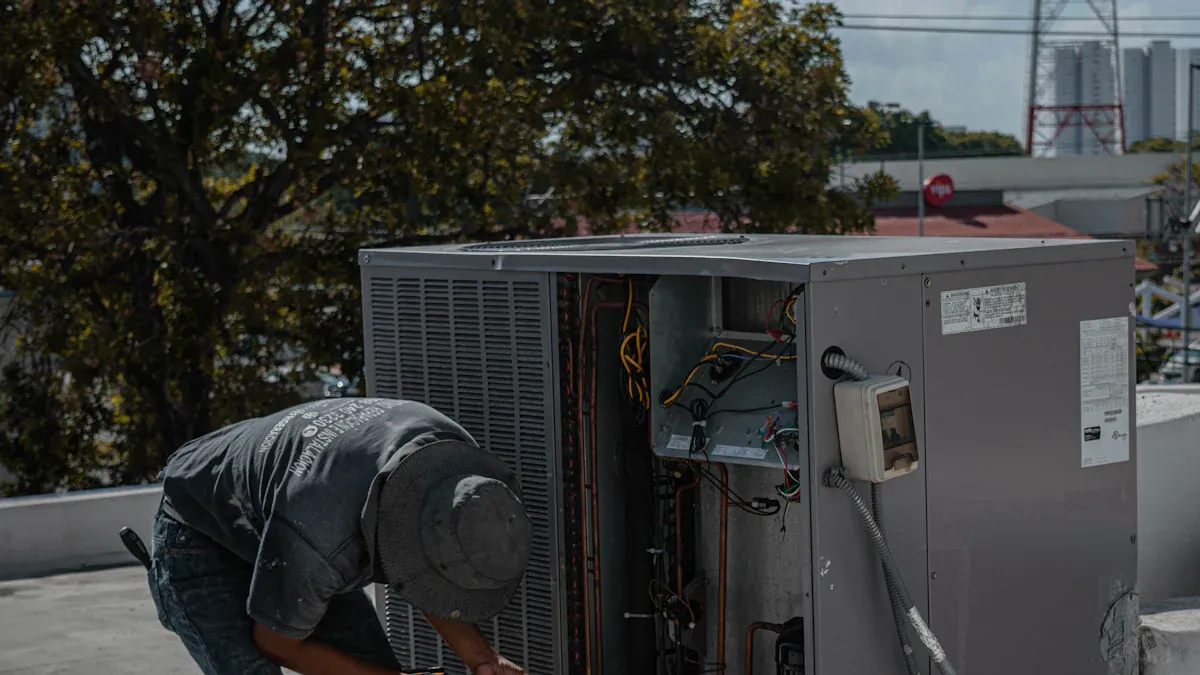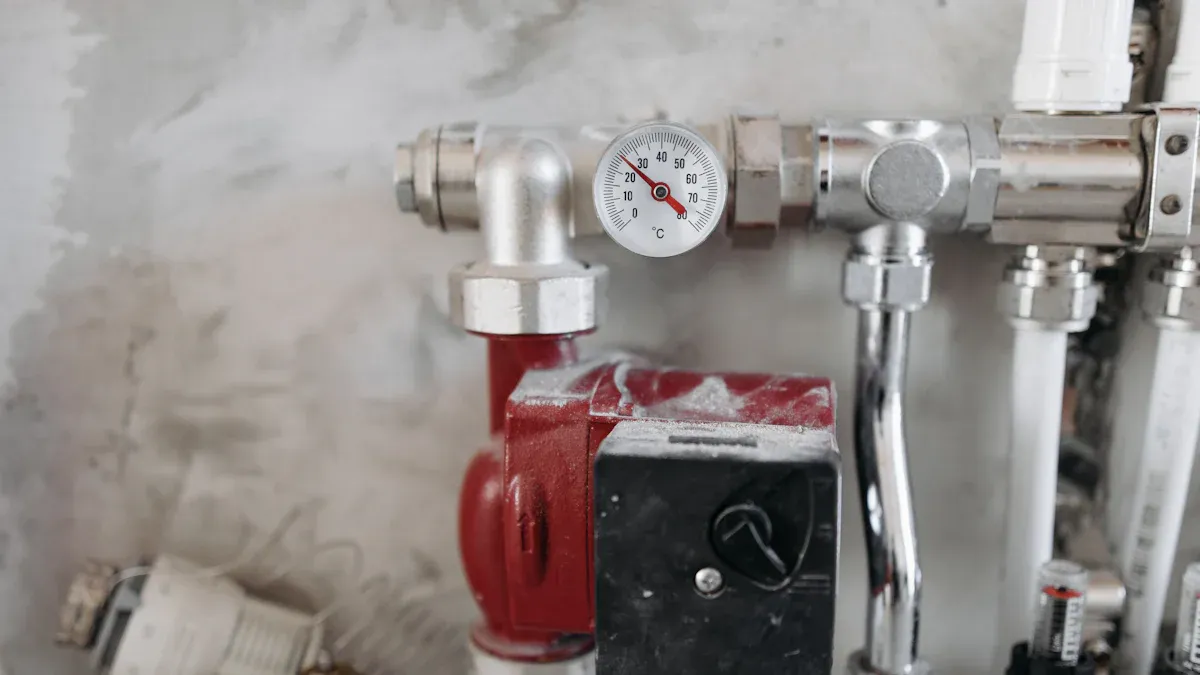Author:
-
Position:
General Manager of Foreign Trade Department, Taojun Refrigeration -
Professional Experience:
Engaged in international trade within the refrigeration industry since 2004.
Expert in brand strategy and omni-channel marketing, having led three multi-million yuan projects that boosted brand exposure by over 200%.
-
Core Competencies:
Proficient in data analysis and user growth strategies.
Skilled in SEO/SEM and social media management tools.
Experienced in cross-departmental collaboration and team leadership.
-
Philosophy:
"Data-driven decisions, creativity-powered branding." Committed to achieving business value and user experience excellence through refined operations. -
Vision:
Eager to collaborate with partners to explore emerging market opportunities and set industry benchmark cases.
Contact Us to Find More Products
Benefits of High-Efficiency Aluminum Filter Driers in HVAC Applications

High-efficiency aluminium Filter Driers enhance HVAC systems by optimizing performance and ensuring consistent energy efficiency. Their advanced filtration capabilities prevent contaminants from circulating, reducing wear on critical components. These aluminium filter driers maintainstable energy consumption due to their innovative design, which minimizes pressure drops without compromising filtration quality. HVAC systems equipped with these components operate more reliably, requiring fewer repairs and less frequent maintenance. This longevity translates into lower operational costs and extended equipment lifespan, making aluminium filter driers an essential upgrade for modern HVAC systems.
Key Takeaways
- Aluminum filter driers help HVAC systems work better by removing water and dirt.
- They use less energy, which lowers costs and makes systems run efficiently.
- Aluminum is light and doesn’t rust, so it helps HVAC equipment last longer with fewer repairs.
- Changing aluminum filter driers often keeps systems working well and avoids expensive problems.
- Buying good aluminum filter driers saves money over time and makes HVAC systems more reliable.
Understanding Aluminum Filter Driers
What Are Aluminum Filter Driers?
Aluminum filter driers are essential components in HVAC systems, designed to protect and enhance system performance. These devices serve two primary purposes: removing moisture from the refrigerant and filtering out contaminants. Moisture in the system can lead to acid formation, which damages critical components and degrades lubricants. Contaminants, such as solid particles, can clog the system and harm precision parts like compressors. By addressing these issues, aluminum filter driers ensure smooth operation and prevent costly repairs.
Filter-driers absorb contaminants like water, which can lead to acid formation, and provide physical filtration. The desiccants used, such as Molecular Sieves and activated alumina, play a crucial role in minimizing water presence and preventing lubricant hydrolysis.
Key Features of Aluminum Construction
The use of aluminum in filter driers offers several advantages over traditional materials. Aluminum is lightweight yet durable, making it ideal for modern HVAC systems. Its corrosion resistance ensures long-term reliability, even in harsh environments. Additionally, aluminum's thermal conductivity enhances the efficiency of the filtration process.
- Molecular sieves used in aluminum filter driers maintain structural integrity across various oils, unlike activated alumina, which can degrade with certain lubricants.
- These sieves provide superior moisture absorption, reducing the risk of acid formation and ensuring optimal system performance.
The combination of aluminum construction and advanced desiccants makes these filter driers a superior choice for HVAC applications.
Role in HVAC Systems
Aluminum filter driers play a critical role in maintaining the efficiency and reliability of HVAC systems. They remove moisture and contaminants, which can compromise system performance. By doing so, they prevent issues like acid formation, oil degradation, and component wear. This ensures that the system operates at peak efficiency, reducing energy consumption and extending equipment lifespan.
| Role/Benefit | Description |
|---|---|
| Moisture Removal | Filter driers remove moisture from the refrigerant, preventing acid formation and oil degradation. |
| Contaminant Filtering | They filter out solid particles that can damage precision components like compressors. |
| System Efficiency | Ensures high efficiency of the cooling system and minimizes the risk of system failure. |
| Maintenance Importance | Regular replacement of filter driers is crucial to maintain system performance and prevent clogging. |
| Composition Consideration | The choice of filter drier composition affects its ability to remove moisture and acids, impacting system compatibility. |
By incorporating aluminum filter driers, HVAC systems achieve better performance, reduced maintenance needs, and longer operational life.
Benefits of High-Efficiency Aluminum Filter Driers

Enhanced System Performance
High-efficiency aluminum filter driers significantly improve HVAC system performance by ensuring optimal filtration and moisture control. Their advanced design allows them to remove over 99% of airborne particleswhile maintaining a low pressure drop. This combination ensures that the system operates smoothly without unnecessary strain on components. By preventing contaminants and moisture from circulating, these filter driers protect critical parts like compressors and valves, reducing the likelihood of malfunctions.
The structure of aluminum filter driers plays a pivotal role in their efficiency. Research highlights that the design of these filters directly impacts their collection efficiency. Optimized aluminum construction enhances their ability to trap particles and absorb moisture, ensuring consistent performance. This makes them an indispensable component for maintaining the reliability of HVAC systems in both residential and commercial settings.
Energy Savings and Efficiency
Energy efficiency is a cornerstone of modern HVAC systems, and aluminum filter driers contribute significantly to this goal. By minimizing pressure drops and ensuring smooth refrigerant flow, these components reduce the energy required for system operation. This leads to lower energy consumption, which translates into cost savings for users.
The lightweight nature of aluminum further enhances energy efficiency. Unlike heavier materials, aluminum reduces the overall weight of the system, making it easier to maintain optimal performance. Additionally, the superior thermal conductivity of aluminum ensures that the refrigerant remains at the desired temperature, further improving energy efficiency. These features make aluminum filter driers a practical choice for those seeking to reduce their carbon footprint while maintaining high system performance.
Extended Equipment Lifespan
The durability and reliability of aluminum filter driers play a crucial role in extending the lifespan of HVAC equipment. By effectively removing moisture and contaminants, these components prevent issues like acid formation and oil degradation, which can cause long-term damage to the system. This proactive protection ensures that critical components, such as compressors and heat exchangers, remain in good condition for longer periods.
Aluminum's corrosion resistance adds another layer of protection, especially in environments with high humidity or exposure to harsh chemicals. This resistance ensures that the filter drier remains functional and effective throughout its service life. Regular use of high-efficiency aluminum filter driers reduces the need for frequent repairs and replacements, ultimately lowering maintenance costs and enhancing the overall longevity of the HVAC system.
Reduced Maintenance and Repair Costs
High-efficiency aluminum filter driers reduce maintenance and repair costs by preventing common HVAC system issues. Their advanced filtration capabilities eliminate moisture and contaminants, which are primary causes of system malfunctions. By addressing these problems proactively, these components minimize the need for frequent service calls and costly repairs.
Tip: Regularly replacing aluminum filter driers ensures optimal system performance and prevents long-term damage to critical components.
Key Ways Aluminum Filter Driers Lower Maintenance Costs:
- Preventing Acid Formation: Moisture in refrigerants can lead to acid formation, which corrodes internal components. Aluminum filter driers absorb moisture effectively, reducing the risk of acid-related damage.
- Protecting Compressors: Contaminants like solid particles can clog compressors and cause wear. These filter driers trap debris, safeguarding precision parts and extending their lifespan.
- Reducing System Downtime: By maintaining clean refrigerant flow, aluminum filter driers prevent unexpected breakdowns, ensuring uninterrupted operation.
Cost-Saving Benefits in the Long Run:
| Benefit | Description |
|---|---|
| Fewer Service Calls | Proactive filtration reduces the frequency of emergency repairs. |
| Lower Replacement Costs | Durable aluminum construction ensures longer service life for filter driers. |
| Enhanced System Reliability | Consistent performance reduces the likelihood of major component failures. |
The lightweight and corrosion-resistant nature of aluminum further contributes to reduced maintenance needs. Unlike traditional materials, aluminum withstands harsh environments without degrading, ensuring reliable operation over time. HVAC systems equipped with aluminum filter driers experience fewer disruptions, allowing users to save on both labor and replacement costs.
By integrating high-efficiency aluminum filter driers, HVAC systems achieve a balance between performance and cost-effectiveness. These components not only enhance system reliability but also provide measurable savings in maintenance and repair expenses.
Aluminum Filter Driers vs. Traditional Filter Driers

Advantages of Aluminum Material
Aluminum offers distinct advantages over traditional materials like steel or copper in filter drier construction. Its lightweight nature reduces the overall weight of HVAC systems, making installation and maintenance more manageable. This feature is particularly beneficial for large-scale commercial systems where weight considerations play a critical role.
The thermal conductivity of aluminum enhances the efficiency of the filtration process. It allows for better heat dissipation, ensuring that the refrigerant remains at optimal temperatures. This characteristic contributes to the overall energy efficiency of the system. Furthermore, aluminum's malleability enables manufacturers to design compact and efficient filter driers without compromising performance.
In comparison to traditional materials, aluminum also provides cost benefits. Its abundance and ease of manufacturing make it a more economical choice for high-efficiency filter driers. These advantages position aluminum as a superior material for modern HVAC applications.
Corrosion Resistance and Durability
Corrosion resistance is a critical factor in the longevity of filter driers, especially in environments with high humidity or exposure to chemicals. Aluminum excels in this area due to its natural oxide layer, which protects it from rust and corrosion. This property ensures that aluminum filter driers maintain their structural integrity over time, even in harsh operating conditions.
Durability is another key advantage of aluminum. Unlike traditional materials that may degrade or weaken under stress, aluminum withstands extreme temperatures and pressures without compromising performance. This robustness reduces the likelihood of leaks or failures, ensuring consistent operation of the HVAC system.
The combination of corrosion resistance and durability makes aluminum filter driers a reliable choice for both residential and commercial HVAC systems. Their ability to perform effectively in challenging environments extends the lifespan of the entire system, reducing the need for frequent replacements.
Superior Filtration and Moisture Removal
Aluminum filter driers outperform traditional options in filtration and moisture removal. Their advanced design incorporates solid desiccant cores with low binding, which enhances moisture adsorption. This feature minimizes the risk of acid formation, a common issue caused by moisture in refrigerants.
The filtration capabilities of aluminum filter driers are equally impressive. They efficiently trap contaminants, such as solid particles, without causing significant pressure drops. This ensures smooth refrigerant flow and protects critical components like compressors from damage.
| Feature | Aluminum Filter Driers | Other Materials |
|---|---|---|
| Moisture Adsorption | High | Variable |
| Contaminant Filtration | Efficient | Less efficient |
| Desiccant Core Composition | Solid core with low binding | Beads or solid core with higher binding |
| Particle Filtration Size | 25 microns | 20 microns (clogs faster) |
| Robustness | High | Lower |
The table above highlights the technical superiority of aluminum filter driers. Their ability to maintain high filtration efficiency while minimizing clogging sets them apart from traditional materials. These features ensure that HVAC systems equipped with aluminum filter driers operate reliably and efficiently, even under demanding conditions.
Installation and Maintenance Considerations
Best Practices for Installation
Proper installation of aluminum filter driers ensures optimal performance and system reliability. Following industry-recommended practices minimizes the risk of operational issues and extends the lifespan of HVAC systems. Key guidelines include:
- Install filter driers in the liquid line to effectively capture moisture and contaminants.
- Position the filter drier before the metering device to protect it from debris.
- Use a wet rag during brazing to prevent overheating and damage to the filter drier.
- Avoid "sweating out" the drier during replacement. Instead, cut it out to prevent contaminants from re-entering the system.
- For replaceable core styles, adhere to torque specifications to avoid warping or compromising the seal.
Tip: Always consult the manufacturer's installation manual to ensure compliance with specific system requirements.
Maintenance Tips for Longevity
Routine maintenance of aluminum filter driers is essential for maintaining HVAC system efficiency and preventing costly repairs. Regular inspections and timely replacements help avoid performance degradation.
- Inspect the filter drier periodically for signs of clogging or reduced efficiency.
- Replace the filter drier whenever the system undergoes major repairs or refrigerant changes.
- Monitor pressure drops across the filter drier. Significant drops may indicate the need for replacement.
- Use only compatible replacement parts to maintain system integrity and performance.
Note: Neglecting filter drier maintenance can lead to moisture buildup, acid formation, and damage to critical components.
Compatibility with Various HVAC Systems
High-efficiency aluminum filter driers are versatile and compatible with a wide range of HVAC systems. Their lightweight construction and corrosion resistance make them suitable for residential, commercial, and industrial applications.
| System Type | Compatibility |
|---|---|
| Residential HVAC Systems | Ideal for compact systems due to lightweight design and efficient moisture removal. |
| Commercial HVAC Systems | Suitable for large-scale systems requiring durable and reliable components. |
| Industrial Applications | Effective in harsh environments with high humidity or chemical exposure. |
Aluminum filter driers adapt seamlessly to different refrigerants and system configurations, making them a practical choice for diverse HVAC applications. Their robust design ensures consistent performance across various operating conditions.
Pro Tip: Verify refrigerant compatibility before installation to maximize efficiency and system longevity.
High-efficiency aluminum filter driers offer numerous advantages for HVAC systems. They enhance performance, reduce energy consumption, and extend equipment lifespan. Their lightweight, corrosion-resistant design ensures durability and reliability in diverse environments. These features make them an essential component for maintaining efficient and cost-effective HVAC operations.
Upgrade Tip: Investing in high-efficiency aluminum filter driers improves system reliability and reduces long-term maintenance costs. Modernize your HVAC system today to enjoy better performance and significant savings.
By choosing advanced filtration solutions, users can achieve optimal system efficiency and long-term peace of mind.
FAQ
What makes aluminum filter driers better than traditional ones?
Aluminum filter driers offer superior corrosion resistance, lightweight construction, and enhanced thermal conductivity. These features improve system efficiency and durability. Unlike traditional materials, aluminum ensures long-term reliability in harsh environments, making it an ideal choice for modern HVAC systems.
How often should aluminum filter driers be replaced?
Replace aluminum filter driers during major system repairs or refrigerant changes. Regular inspections can help identify clogging or reduced efficiency. For optimal performance, follow the manufacturer's recommendations regarding replacement intervals.
Are aluminum filter driers compatible with all refrigerants?
Most aluminum filter driers are compatible with a wide range of refrigerants. However, users should verify compatibility with their specific refrigerant type before installation. This ensures optimal performance and prevents potential system issues.
Can aluminum filter driers reduce energy costs?
Yes, aluminum filter driers minimize pressure drops and maintain smooth refrigerant flow. These features reduce energy consumption, leading to lower operational costs. Their lightweight design also contributes to overall system efficiency.
Do aluminum filter driers require special installation procedures?
Aluminum filter driers require standard installation practices, such as positioning them in the liquid line and protecting them during brazing. Always consult the manufacturer's guidelines to ensure proper installation and system compatibility.
Tip: Proper installation and regular maintenance maximize the lifespan and efficiency of aluminum filter driers.








